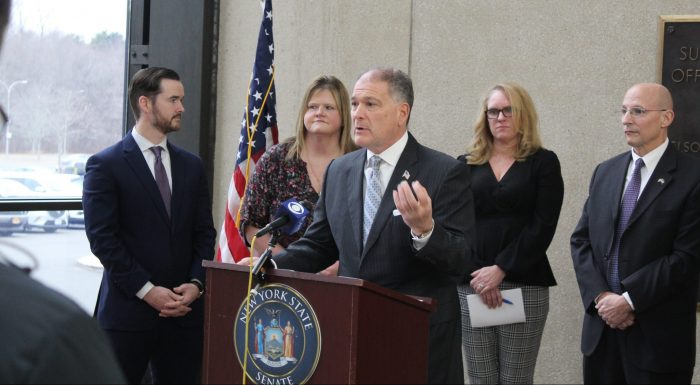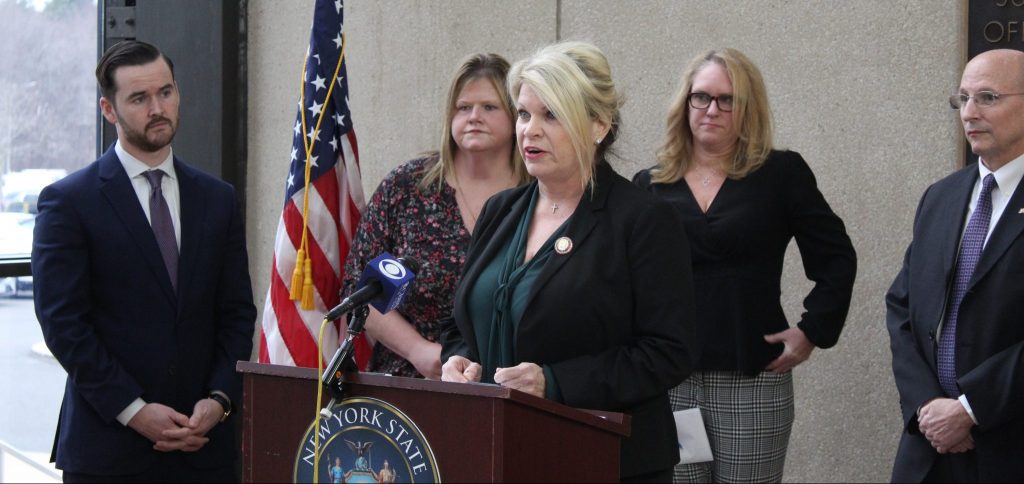GOP officials, advocates press Gov. Hochul for additional child care appropriations

In an effort to influence the upcoming state budget, Republican officials in the New York State Legislature joined policy advocates at the Perry B. Duryea State Office Building in Hauppauge Thursday, Dec. 15.
The officials called the press event to raise public awareness about the lack of child care services on Long Island, hoping to pressure Gov. Kathy Hochul (D), who is preparing the state budget for the 2024 fiscal year.
Child care on Long Island “is not a problem, it’s a crisis,” said Dean Murray, state Sen.-elect (R-East Patchogue), who organized the event. “We are at a crisis level on Long Island when it comes to child care, and there is no simple solution.”
Murray regarded the issues associated with child care as threefold. For him, the state government can remedy the problem by addressing its affordability, availability and accessibility.
While Murray applauded Hochul and the Legislature for targeting the issue in last year’s budget, he said the changes do not adequately account for regional economic differences throughout the state.
“The cost of living here on Long Island does not compare to areas upstate,” he said, “So when you have a statewide standard, it simply isn’t fair to regions like Long Island.”
He added that the child care is underfunded, arguing, “We need to do what we can as a government to help to create more availability, helping to build more facilities, helping to encourage employers to offer on-site child care.”
The state senator-elect regarded child care service as “a profession, not a job.” However, he said these professionals are often underpaid.
“Can you think of a job that’s more important than caring for our kids?” he said. “This is a professional job. [The workers] need to be treated as such, and they need to be compensated as such.”
State Sen. Mario Mattera (R-St. James) explained the problem similarly. He detailed the underinvestment in child care personnel, saying the incentive is to pursue other industries.
“The people right now with child care are leaving because they’re getting other jobs,” Mattera said. “They’re getting better [paying] jobs even in McDonald’s. That’s a problem.” He added, “They are watching our kids and protecting our children, but they’re not getting paid properly.”
Mattera also addressed the need for more child care training programs. If child care is to be a profession, he said these service providers deserve similar specialized teaching to those of other fields.
“We need to educate,” the state senator said. “We need to make sure [institutions] like Suffolk Community College, a perfect example, have some kind of a course … to have qualified people watching our children.”
Jennifer Rojas, executive director of the Commack-based Child Care Council of Suffolk, discussed the adverse effects of the COVID-19 pandemic on the child care industry. While these essential services remained operational throughout the public health emergency, the industry has struggled since.
“When everything shut down in March of 2020, child care remained open because we knew how important it was for our essential workers to continue to work,” she said. “Unfortunately, our industry is in a crisis. … It’s expensive for parents, and the workforce is making poverty wages.”
She added, “It’s because you cannot raise the cost on parents in order to pay your staff more, so we’re stuck in this bubble where providers are not able to pay their staff and, therefore, not able to recruit.”
Without sufficient staff, Rojas said some child care programs are cutting back resources and, in some instances, shutting down altogether. “This is a crisis like we have never seen in this industry, and it’s always been an industry that has operated on razor-thin margins,” she added.

State Assemblywoman Jodi Giglio (R-Riverhead) echoed Rojas’ sentiments about the crippling effects of COVID-19 on child care service providers. To Giglio, the lockdowns generated conditions where child care was less necessary for parents.
“Because the moms couldn’t go to work and everybody was expected to stay home, a lot of these facilities closed down,” she said. “It costs a lot because your payroll is not going down and you’re still turning the lights on every day.”
Also in attendance was Ryan Stanton, executive director of the Long Island Federation of Labor, who emphasized the inordinate expenses associated with child care and the need for state support.
“In both Nassau and Suffolk counties, the cost of care is about $30,000 a year,” he said. “That is more than going to the State University of New York for an entire year. You have working families struggling to make ends meet. In order to go to work, [they] must have care in many instances. And we’re asking them to pay for a college tuition bill or more.”
Giglio, a member of the state Assembly’s Labor and Economic Development committees, suggested funding child care to remediate labor shortages, viewing such an investment as an economic development tool.
“We have warehouses out there that are full of materials, waiting to be delivered to customers, and those items are not getting delivered because they don’t have the drivers,” she said. “We need to get people back to work. Employers are looking for workers, and parents are looking for a better life for their families.”
Concluding the press conference, Murray outlined some possible solutions. He recommended removing the statewide eligibility standard to resolve the regional economic differences between Long Island and the rest of the state.
“Because of our economic diversity here, [the statewide standard] doesn’t serve Long Island like it should,” the state senator-elect said. “Rather than a statewide eligibility level, we should break it into the 10 regional economic development council regions.”
With different standards for different regions, Murray maintained that Long Islanders could qualify for additional state aid for child care, reflective of their higher cost of living. “This is a fairer way, especially for Long Island families,” he said.
Murray said another way to improve the issue is through employer-based on-site child care. He offered that expanding these benefits could assist working families and employers alike.
Speaking to employers directly, he said, “If you offer on-site child care as a benefit to your employees, I guarantee you that will put you above your competition in the game of recruitment,” adding, “What we want to do is incentivize that.”
Lastly, he suggested exploring any changes in state regulations that may be holding up the construction of new child care facilities. “We also need to sit down and look at whether or not there are regulations slowing down the building of health care facilities,” Murray said.
He added, “Let me be very clear: We will never change any regulations that deal with the health, the safety or the well-being of the children. But we should take a look at the regulations otherwise and see if they are slowing them down.”
Hochul is expected to release her proposed FY 2024 budget next month.






